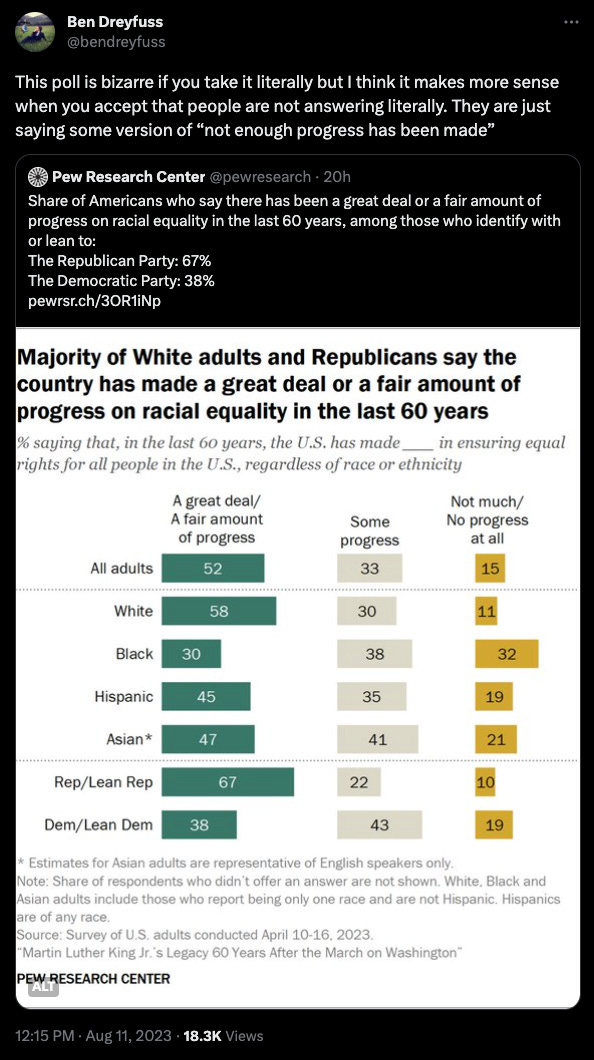E-Pluribus | August 11, 2023
American cruelty, perplexing language guides, and deep-level diversity is a better measure than surface-level diversity.
A round-up of the latest and best writing and musings on the rise of illiberalism in the public discourse:
Seth Moskowitz: America Has A Cruelty Problem
One need not spend more than a few minutes browsing X/Twitter or Reddit to realize that people online, especially those with anonymity, can be extremely cruel. That impulse for mockery and callousness, Seth Moskowitz argues at Persuasion, has been exacerbated by our growing political polarization.
The more consequential question is why otherwise decent people are driven to cruelty. Unfortunately, it seems to be part of our nature. Going back hundreds of thousands of years, humans have always drawn sharp distinctions between those who are part of an in-group and those who are not. When our species spent most of its time hunting, gathering, and warring with neighboring tribes, the ability to dehumanize one’s adversaries and treat them with cruelty may have been an evolutionary advantage.
In the United States today, the principal dividing line is politics. Americans are increasingly likely to see their partisan adversaries not just as people with bad ideas about politics, but as bad people. Clear and growing majorities of both Democrats and Republicans say that those on the other side are immoral, dishonest, and closed-minded. The relationship between the rising polarization and casual cruelty is a feedback loop in which more polarization feeds more cruelty, which feeds more polarization, which feeds more cruelty, which feeds….
The internet is unquestionably an exacerbating force in all this. The very things that feed our capacity for cruelty—the tendency to divide the world into us versus them, to abstract away the humanity of the “other,” to see only the worst stereotypes of the other side—are rewarded and ratcheted up online, especially on social media sites like Twitter and Reddit. The people who pick up followers and get likes are usually the most aggressive and vindictive, not the ones who treat their adversaries with grace and empathy.
Read the full piece.
John J. Miller: Guides That Perplex
As language evolves, many colleges and universities have scrambled to keep up, regularly revising guides about what adjectives, pronouns, and other descriptors are okay to utter. At National Review, John J. Miller highlights some of these strange and contradictory “language guides” that attempt to prescribe what words are allowed and acceptable to use, at least for now.
Just about every college and university now seems to have guides to “inclusive” language. In the last decade or so, they have become a genre of bureaucratic literature, full of recommendations and regulations. They’ve also created a paradox for progressives, who lately have crusaded in behalf of so-called banned books in school and community libraries. In the halls of academe, they seek to ban words and phrases.
Most of this goes unnoticed, though occasionally a silly or provocative choice makes national news. A guide at the University of California, Irvine, for example, became notorious about a year and a half ago for its discouragement of the idiom “kill two birds with one stone.” The problem for UCI was not that this hoary phrase is a worn-out cliché, but rather that it employs “violent language.” UCI suggested replacing it with a bad rhyme: “Feed two birds with one scone.” That led to a round of mockery on social media. The guide weathered the negative attention and remained in place. It’s still good for a laugh, but its persistence also reveals the determination of today’s language police. They don’t confine their assaults to English, either. At Michigan State University, the Department of Romance and Classical Studies has a website devoted to “non-binary/inclusive language” for French, Italian, and Spanish — languages whose nouns, pronouns, and adjectives are, as a matter of grammar, either masculine or feminine.
[ . . . ]
The authors of campus language guides, however, are up to something else. Their goal is not to describe how people speak and write but rather to prescribe it, in an ongoing struggle to shape and control thought itself. Their inadvertent muse is George Orwell, who identified this agenda better than anybody before or since, first in essays in the 1940s and then in his novel 1984, which introduced “Newspeak,” a satiric lingua franca that shows how totalitarians impoverish language to crush freedom. “Don’t you see that the whole aim of Newspeak is to narrow the range of thought?” says a character at the lie-infested Ministry of Truth. “In the end we shall make thoughtcrime literally impossible, because there will be no words in which to express it.”
Read it all.
Ryan Ruffaner: Ditching Diversity Myths
We at Pluribus have attempted to define the concept of “diversity,” especially as it relates to efforts to promote it in professional and classroom settings. At Quillette, Ryan Ruffaner argues that it’s important to consider the differences between what the scientific literature identifies as “surface-level diversity” (things like age, sex, race, and ethnicity) and “deep-level diversity” (things like beliefs, attitudes, and values) when evaluating how diversity affects the workplace.
The research that focuses purely on true surface-level diversity isn’t much better. As David A. Harrison, Kenneth H. Price, and Myrtle P. Bell point out in their literature review and experiment on these two types of diversity (more on this later), the effects of commonly studied surface-level diversity characteristics have been inconsistent across studies, and even within studies. In fact, the findings of surface-level diversity studies have been so inconsistent that they differ on whether or not surface-level diversity has any effect on other variables. Some studies even show that surface-level diversity has negative impacts on factors like organizational commitment and job satisfaction, while others show a positive impact. Curiously, these inconsistencies are particularly strong on the effects of race and sex, the two variables that people tend to be most vocal about.
Harrison et al. suggest that some of this inconsistency may arise from the mistaken belief that demographic differences among employees are highly related to differences in attitudes. They are not. There is no correlation between a person’s race, ethnicity, age, and sex and their attitudes. People of diverse races, ethnicities, ages, and sexes can vary in their opinions, their values, their beliefs, their hobbies, and their priorities. And yet, the diversity train keeps chugging along. Why?
Part of this comes from America’s history of discrimination, particularly along the lines of race and sex. The Emancipation Proclamation sought to correct some of this historical injustice, which the Civil Rights movement and the Civil Rights Act of 1964 sought to further rectify. And because America’s past discrimination was mostly justified with reference to citizens’ surface-level differences, these have been the overwhelming focus of the diversity movement. The problem is that modern diversity initiatives seem to be driven, at least implicitly, by two hypotheses with which many DEI advocates are unfamiliar: the similarity-attraction paradigm and the contact hypothesis.
The similarity-attraction paradigm holds that the more similar we perceive other people to be to ourselves, the more attracted to them we’ll be. However, it is wrong to assume that important similarities are only skin-deep. Before designing their experiment, Harrison et al. conducted a literature review on theoretical perspectives from the fields of organizational behavior, sociology, and social psychology. They found support for the idea that while we initially categorize people based on stereotypes, we modify or replace these stereotypes with “deeper-level knowledge” of these people’s psychological qualities once we get to know them better.
Read more here.
Around Twitter
Ben Dreyfuss on a new Pew Research Center poll on racial progress in the U.S. over the last 60 years.
Wesley Yang weighs in on a policy requiring schools to notify parents if a student requests to adopt a new gender identity.
And finally, is the Missouri v. Biden case we recently wrote about heading to SCOTUS? Via Michael Shellenberger:









